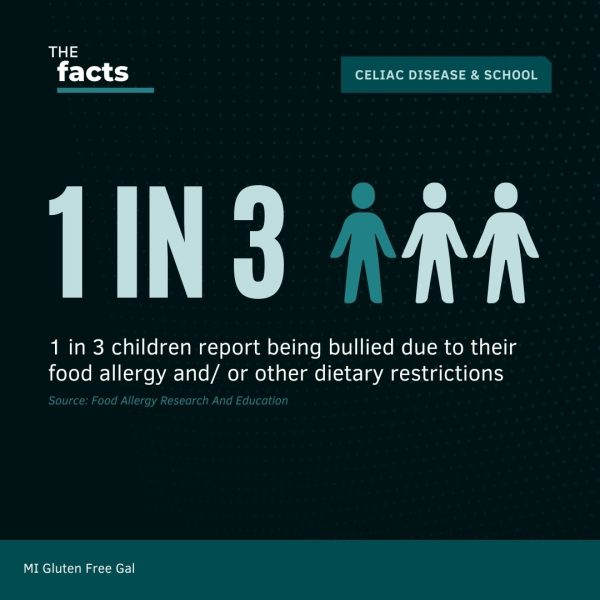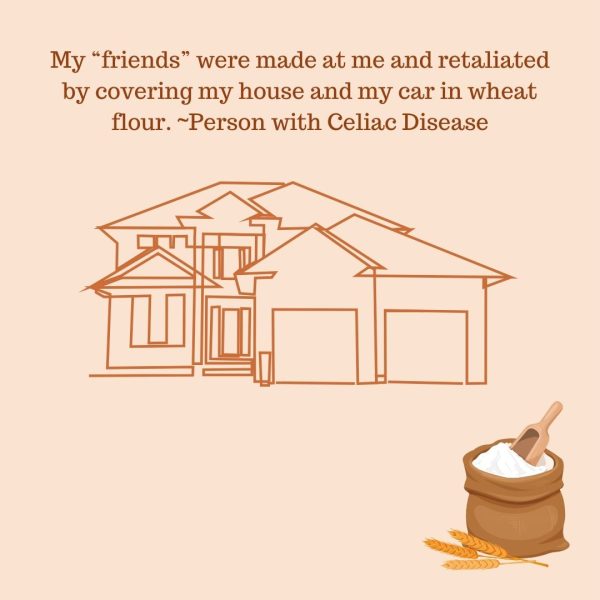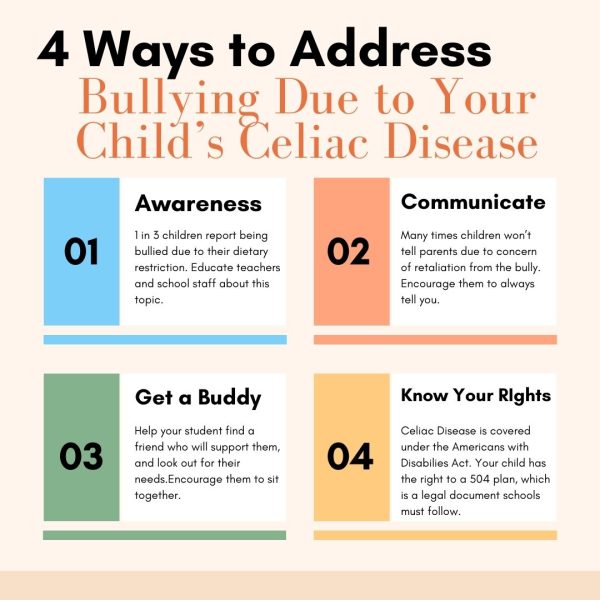Food Allergy Bullying and How to Stop It
As an Amazon Associate and member of other affiliate programs, I earn from qualifying purchases.
Food Allergy Bullying. I simply can’t wrap my mind around those who choose to humiliate others due to a dietary restriction. So what actions can we take to improve this situation?

Gluten Free Eaters Not Welcome at the Party
The above photo is from a Super Bowl commercial a few years ago, which made fun of those who need to eat gluten free. Luckily, the ad was pulled relatively quickly, but the damage had been done. Seen by adults and children, it reinforced society’s perception that we’re “difficult.”

Children as Targets of Food Allergy Bullying
As I watched this ad, my mind thought of the more than 5 million kids in our country living with food allergies. Did you know a third of them, almost 2 million children, experience harassment every year because they have a dietary restriction?
Others taunt, threat, harass and ostracize these children because their bodies perceive food as a threat. Because the physical reaction is so serious, food allergies and Celiac Disease qualify as a disability, protected by law.
But It’s Just a Joke….
I see people comment this all the time. They say “no one would do this in real life.” However, there are plenty of stories where people HAVE done just that.
- Restaurant Owner Sent to Jail Over Food Allergy Negligence
- Family wins $200,000 Lawsuit Against Restaurant who Neglectfully Fed Her Allergen
- High School Football Player Changes Schools After Peanut Allergy Harassment
- College Student Pleads Guilty in Smearing Peanut Butter on Allergic Student
- Teen Charged with Assault After Attacking Teen with Food Allergen
- Three Teens Charged with Assault After Attacking Classmate with Pineapple Allergy
- London Child with Dairy Allergy Dies After Classmates Taunt Him with Cheese
I want people to remember that there 20 MILLION people in the US live with food allergies. While you may not have a family member who lives with a food allergen, it’s possible that a friend of yours does. Making rude jokes about this topic shows you’re not a safe space for their family.
Also, a reminder that your kids are watching and hearing the content you consume on social media. You may hear a joke like this and not say anything. But children, whose brains aren’t fully formed and don’t understand certain consequences, are watching. If you think it’s funny, it’s more likely they’ll treat another kid this way.
DYK Celiac Disease Is Covered Under Disability Law
Think that’s a stretch? Not really. A disability is defined as “physical or mental issue that seriously limits one or more major life activities.” When you have a peanut allergy and its presence affects your ability to breathe, I’d say that limits a major life activity.
Celiac Disease is considered one as well. When consuming gluten can affect your mental status, your hormone and nutrient levels, that is definitely a limit to daily function. Not to mention being able to go a day without constantly being on a toilet, it affects being able to hold down a job, etc.

Food Allergy Bullying is Not as Rare as you Think
When I first heard of food allergy bullying, I imagined it had to be rare. How could anyone do such a thing? To this day, I’m still affected by the story of Eleanor Garrow’s son, which I read in 2013 in Gluten Free and More Magazine.
Her son, who has a peanut allergy, was attacked by another child and intentionally smeared with peanut butter. This could have been a deadly experience. Per the article, he struggled emotionally for quite a while due to that abuse.
FARE, short for Food Allergy Research and Education, reported that “about one-third of kids with food allergies report that they have been bullied because of their allergies.” In a “2010 study by doctors at Mount Sinai Medical Center, 21% of kids reported being bullied by a teacher or other school staff.” So sad, and unnecessary.
Sadly, it’s not just kids that are the perpetrators of food allergy bullying. There are stories of parents of non-allergic kids threatening to coat the backpack of child with their deadly allergy. In another story, a parent encouraged their child to walk down the hall, smearing peanut butter on the walls, after the school declared themselves to be a peanut-free zone.

Adults Are Not Immune from Being Bullied about Their Dietary Restrictions
Adults are not immune from these threats either. A young woman with Celiac Disease shared in a Facebook group that her “friends” retaliated against her by covering her car and property in wheat flour. I can’t even fathom someone doing this.
And of course, those of us with Celiac Disease have recently been the topic of jokes in the entertainment industry. It has all added to the growing lack of compassion for those with food intolerances.
What can we do to turn the tide? How do we stop bullying and grow compassion about the issue of food allergy bullying?

4 Things You Can Do to Help Counteract Food Allergy Bullying
Grow Awareness of Food Allergy Bullying
First we should start by explaining how serious food allergies and Celiac Disease are. FARE has created a PSA that can be shown on television and in schools. It’s also important to train teachers how to address the issue appropriately. Sometimes teachers use words to address why certain foods are not allowed in a classroom that actually increase the possibility of bullying. This article from FAACT also includes resources.
Convince Children to Tell You When it Happens
Food allergy bullying doesn’t get much attention because children are afraid to speak up. They fear if they address the issue it will draw attention to themselves or make the bullies angry. However, the only way to fix the situation is for your student to tell you. Constantly communicate with your child about how things are going. If they suddenly seem disinterested in school, this may be part of the reason why.
Stand Up For One Another – Get a Buddy
Many times the “positive” light in food allergy bullying stories is when a friend stood up for a food allergic child. Like in Charlotte’s story, having a friend keep an eye on their lunch box if they get up to use the bathroom can make a huge different. Standing up for one another also applies to us as adults. We need to be willing to “set others parents straight” when their speech can encourage misunderstandings or taking food allergies flippantly.
Know Your Rights
Your child qualifies for a 504 plan, as food allergies and Celiac Disease are covered as a disability,. A 504 plan is a binding legal document between parents and the school. It outlines how your child will be protected while at school.
What About Legal Representation?
Personally, I’m not usually one to seek out financial compensation. However, some acts are especially egregious, and legal representation may be needed.
I am a huge fan of Mary Vargas of Stein & Vargas. She’s handled large cases, and their offices are in DC and Maryland. Notably, she represented the child at Williamsburg, who faced discrimination because of his Celiac Disease. Buckfire Law in Michigan represents clients with Food Allergy claims.
As time goes by, it seems that society gets uglier and uglier. The greatest chance we have to make a positive change is to spread awareness and foster compassion. People pick on those that they feel are weaker. Let’s show them that we’re stronger, together.
Have you or your child been the victim of food allergy bullying? How have you handled the situation? Please share your strategies below so we can help each other.
